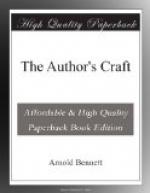Nor can there be any satisfaction in doing badly that which might be done well. If an artist writes a fine poem, shows it to his dearest friend, and burns it—I can respect him. But if an artist writes a fine poem, and then by sloppiness and snobbishness allows it to be inefficiently published, and fails to secure his own interests in the transaction, on the plea that he is an artist and not a merchant, then I refuse to respect him. A man cannot fulfil, and has no right to fulfil, one function only in this complex world. Some, indeed many, of the greatest creative artists have managed to be very good merchants also, and have not been ashamed of the double role. To read the correspondence and memoirs of certain supreme artists one might be excused for thinking, indeed, that they were more interested in the role of merchant than in the other role; and yet their work in no wise suffered. In the distribution of energy between the two roles common sense is naturally needed. But the artist who has enough common sense—or, otherwise expressed, enough sense of reality—not to disdain the role of merchant will probably have enough not to exaggerate it. He may be reassured on one point—namely, that success in the role of merchant will never impair any self-satisfaction he may feel in the role of artist. The late discovery of a large public in America delighted Meredith and had a tonic effect on his whole system. It is often hinted, even if it is not often said, that great popularity ought to disturb the conscience of the artist. I do not believe it. If the conscience of the artist is not disturbed during the actual work itself, no subsequent phenomenon will or should disturb it. Once the artist is convinced of his artistic honesty, no public can be too large for his peace of mind. On the other hand, failure in the role of merchant will emphatically impair his self-satisfaction in the role of artist and his courage in the further pursuance of that role.
But many artists have admittedly no aptitude for merchantry. Not only is their sense of the bindingness of a bargain imperfect, but they are apt in business to behave in a puerile manner, to close an arrangement out of mere impatience, to be grossly undiplomatic, to be victimised by their vanity, to believe what they ought not to believe, to discredit what is patently true, to worry over negligible trifles, and generally to make a clumsy mess of their affairs. An artist may say: “I cannot work unless I have a free mind, and I cannot have a free mind if I am to be bothered all the time by details of business.”




